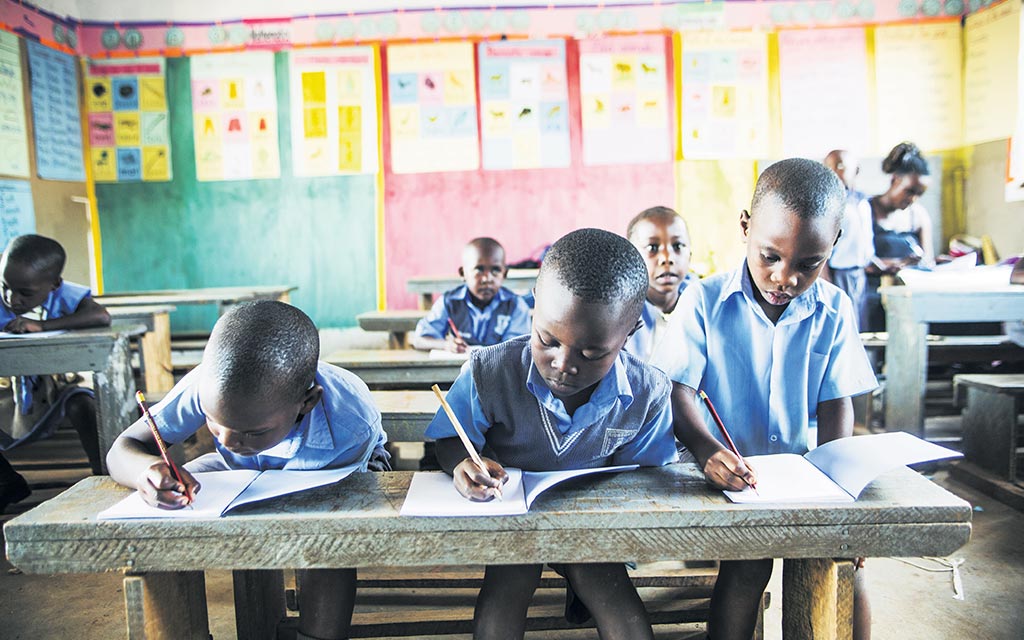How microfinancing has changed African communities for the better

Education is essential in breaking the cycle of poverty but, globally, over 57m children do not attend primary school and the majority of that number live in Africa. For those that do attend, they walk great distances to get there and, when they arrive, classes are often overcrowded and managed by overworked teachers. Opportunity International, a global microfinance charity, believes it’s found the answer; changing the provision of finances to fuel education and create jobs for a whole community.
Founded in 1971 by Al Whittaker, former president of Bristol Myers International Corporation in the United States and Australian entrepreneur David Bussau, the non-profit organisation was one of the first to recognise the benefits of microfinance – in brief, financial services for people without access to banks or funding opportunities – and how this could be used to alleviate poverty in the developing world.
Today, the charity has supported over 12m men and women in over 22 countries, providing them with loans, savings accounts and financial management training that give people a better and more sustainable chance of setting up a business and working to provide for themselves and their families.
But the situation isn’t going to change overnight. Opportunity International aims to create and sustain 20m jobs by 2020 so that whole communities can lift themselves out of poverty and work for a better future. Its education finance programme is key to achieving this; it focuses on supporting entrepreneurial school proprietors to build and grow good quality, low cost community schools.
“Our model is not a traditional top-down charity,” says Nathan Byrd, head of education finance at Opportunity International. “We do not give anything away. Instead, we package extensive knowledge together with innovative financial products and services that enable men and women to work their own way out of poverty.”
The charity has worked with more than 3,000 such educational establishments, where it has provided tailored loans and training to school proprietors to enable them to build better facilities and take on more students. Just in Uganda, 398 schools have benefitted from the programme. A recent study of 138 of these schools found that enrolment grew by 22.5 per cent on average and added one new teacher for every 15 students, which is a huge achievement in a country where the national average is one teacher to every 46 students.
The financial sustainability of each school has also increased by more than 60 per cent on average, and the majority of this money has been reinvested into improving infrastructure and education, expanding enrolment and offering tuition waivers for up to 15 per cent of children whose parents struggle to pay fees.
Many of the schools now play a vital role in providing education and jobs, overcoming the barriers of cost, distance and quality. Over the years, they’ve become engines of economic development in their communities by creating jobs and further opportunities. Employing teachers, security guards, cooks and drivers – these same schools are also providing a market for utility services, uniform making, food sales, school supplies and construction. In other words, a thriving community school boosts the local economy which, in turn, provides more opportunities for struggling parents to access and educate their families, break the cycle of poverty and transform their lives.
Like Evans Ssenabulya, an educational pioneer in his community. Like most parents, Evans and his wife wanted a good education for their three daughters so they could see them grow up to do better than themselves.
Yet they noticed that many children in their village in Uganda – especially the girls – didn’t attend state school because it was too far away and expensive to attend. So Evans decided to start a local school with 100 students meeting in a small wooden structure on a rented plot of land.
Now, just six years later and, with support from Opportunity International in the form of a loan and training, he owns the land and has grown the Ridgeway School beyond all recognition. It now provides day and boarding education to over 900 students.
Not only have Evans and his wife given the children in their community a quality education, they’ve also provided jobs for their parents. A number of individuals, trusts and charities support Opportunity International’s work; these include City A.M., Players of People’s Postcode Lottery, ANZ bank, Vitol Foundation, Old Mutual Group, Clear Channel and the Credit Suisse Foundation.
If you would like to find out more or make a donation to Opportunity International, please visit opportunity.org.uk or call 01865 725304. To make a donation by post please send cheques payable to ‘Opportunity International UK’ to Opportunity International, Angel Court, 81 St Clements, Oxford, OX4 1AW.
